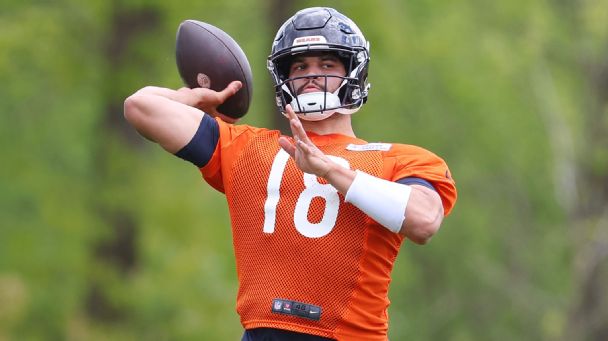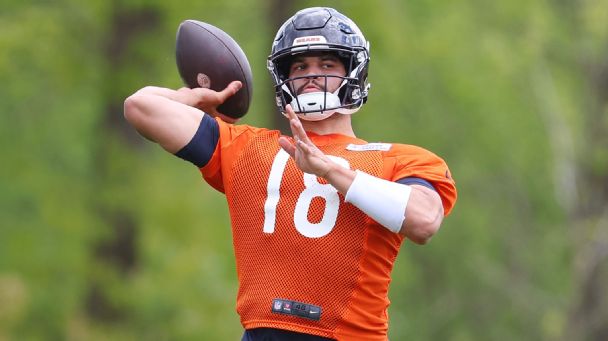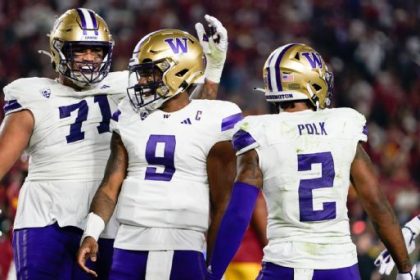
With fantasy football managers beginning their summer prep, it’s a good time to take another look at the 2024 rookie class. Specifically, I’m focusing on the rookies who should be selected in all 10-team redraft leagues.
While the quarterbacks at the top of the NFL draft got a bunch of the headlines, there is also a deep group of talented wide receivers who can impact the fantasy landscape quickly. In addition, there are a few running backs to keep on your fantasy radar during training camps. So let’s get into it, starting with the quarterbacks worthy of consideration in all leagues.
Quarterback
Caleb Williams, Chicago Bears: A natural creator with the ability to produce difference-making plays, Williams has the dual-threat traits to generate viable fantasy production as a rookie. Keeping him on schedule as a pocket thrower will be a priority, but with a proven pair of veteran pass-catchers (DJ Moore and Keenan Allen), plus dynamic rookie Rome Odunze, Williams has the highest ceiling of any quarterback in the 2024 class. He should be targeted in redraft leagues as a high-end QB2 and has the talent to jump into the lower-tier QB1 mix as the season progresses.
Jayden Daniels, Washington Commanders: Daniels is an electric, dual-threat talent with the field vision and throwing efficiency to produce from the pocket. Under new offensive coordinator Kliff Kingsbury, the Commanders can set up Daniels with a mix of pro and spread concepts, maximizing his ability to anticipate windows. Plus, with his ability to carry the ball on designed runs and create big plays off scramble attempts, Daniels can add rushing totals to your lineup. With a true No. 1 target in Terry McLaurin, you can draft Daniels as an upside play who has the ability to produce early in Year 1.
Running back
Jonathon Brooks, Carolina Panthers: Brooks suffered an ACL injury in November, so we need to monitor his progress this summer. If cleared to play during camp, Brooks has the three-down traits to create an immediate fantasy impact. He’s a slasher with great vision, and he has the second-level elusiveness to win in the open field. Plus, Brooks has the receiving skills to create positive matchups. He’s an upgrade over Chuba Hubbard and Miles Sanders in Carolina and should be targeted as a flex/RB2.
Trey Benson, Arizona Cardinals: Benson has the pro frame (6-foot, 216 pounds) and contact balance to thrive as a downhill runner in Arizona. With his 4.39 speed, Benson can hit home runs, too. As a receiver, he can work the underneath levels and produce as a screen target. Benson is a smart insurance play behind starter James Conner, who has missed four games in each of his past two seasons. Benson will play a rotational role as a rookie and is worth a late-round pick in redraft leagues.
Blake Corum, Los Angeles Rams: Corum has excellent vision and contact balance, which fits Sean McVay’s run game in Los Angeles. As he showed at Michigan, Corum is a grinder who can handle a high volume of touches from week to week, including as an underneath outlet in the pass game. With Kyren Williams leading the way for the Rams’ backfield, Corum’s ceiling is limited as a rookie. But he should be targeted late in drafts as an insurance back who would elevate to RB2 status if Williams sustained an injury.
Wide Receiver
Marvin Harrison Jr., Arizona Cardinals: Harrison reminds me of DeAndre Hopkins. He has the route-running skills, coverage awareness and body control/ball skills to produce immediate fantasy results. As Kyler Murray’s No. 1 option in Arizona, Harrison will get plenty of volume, and he has the ability to isolate in scoring position. Considering the anticipated targets and his pro-ready traits, Harrison should be drafted as a fringe WR1.
Malik Nabers, New York Giants: Nabers is an extremely explosive mover. He can roll past defenders on vertical concepts from slot or boundary alignments, plus he has the physical catch-and-run traits to produce in open grass. Yes, the Giants need to see a higher level of play from quarterback Daniel Jones this season, but there’s no question Nabers can elevate the pass game. He should be drafted as a WR3, with the ability to produce lower-end WR2 numbers.
Rome Odunze, Chicago Bears: With a physical profile at 6-foot-3 and 212 pounds, Odunze fits as the boundary X in a Bears offense that will major in three-wide receiver sets. Odunze can go get it as a vertical target and make plays on contested throws. Plus, Odunze is instinctive after the catch and has the traits to develop quickly as a top red zone option for rookie quarterback Caleb Williams. With veteran receivers DJ Moore and Keenan Allen demanding targets in this offense, Odunze enters a crowed wide receiver room, but he has the traits to produce WR3 weeks this season.
Brian Thomas Jr., Jacksonville Jaguars: Thomas joins the Jaguars as the replacement for Zay Jones, giving quarterback Trevor Lawrence a vertical element in the pass game. Thomas has excellent ball-tracking skills, plus the proven the ability to separate at the third level of the field. In Doug Pederson’s system, Thomas can also be schemed to attack interior voids. You can draft Thomas as a WR3 who has the ability to produce breakout weeks with his big-play ability.
Ladd McConkey, Los Angeles Chargers: McConkey can operate as a prime target for quarterback Justin Herbert in L.A. this season. With heavy play-action elements in Jim Harbaugh’s offense, which will open middle-of-the-field voids, McConkey can live between the numbers on catch-and-run targets. Plus, we know he has the quickness and savvy route traits to uncover in one-on-one matchups. McConkey, who checked in with a 4.39 40 at the combine, fits here as a volume WR3/flex.
Xavier Worthy, Kansas City Chiefs: An electric mover with ridiculous 4.21 speed, Worthy can stretch defenses vertically or run away from coverage on crossers and over routes. In Andy Reid’s offense, look for Worthy to be deployed as a multilevel target for quarterback Patrick Mahomes. The Chiefs have some depth at wide receiver now, and tight end Travis Kelce remains the No. 1 option for Mahomes. However, given Worthy’s speed and big-play chops, he should be drafted as a late-round WR3, with potentially more upside in non-PPR formats.
Keon Coleman, Buffalo Bills: At 6-foot-3 and 213 pounds and possessing high leaping ability, Coleman can make plays at the third level for quarterback Josh Allen. He’s a physical, middle-of-the-field target who can drop his pads after the catch. With both Stefon Diggs and Gabe Davis no longer in Buffalo, the door is open here for Coleman to play as a multilevel target in Buffalo. He should be drafted in all formats as a potential WR3.
Xavier Legette, Carolina Panthers: Legette has the straight-line juice and power to make plays down the field, and he brings a physical element after the catch. He can shift gears and go on underneath throws. Legette will work opposite veterans Diontae Johnson and Adam Thielen, so he could see volume limitations early in the season, which puts him in the deeper WR3 mix.
Adonai Mitchell, Indianapolis Colts: A sudden mover at the release and at the top of routes, Mitchell can emerge as a vertical threat for quarterback Anthony Richardson. He’ll have competition for targets in Indianapolis with Michael Pittman Jr. and slot man Josh Downs. However, if you play in a deeper league and want to take a shot on late-round pick with playmaking upside and elite ball skills, then Mitchell is your guy.
Tight end
Brock Bowers, Las Vegas Raiders: The unquestioned top tight end prospect in the 2024 class, Bowers has the route-running traits to uncover versus safeties and linebackers, and the ability to stretch the seams. Plus, he’s a skilled and rugged mover after the catch. While the club drafted TE Michael Mayer in the second round last year, Bowers is the Raiders tight end you want to roster in fantasy. He’ll be a fringe TE1 as a rookie with the ability to produce breakout games.










